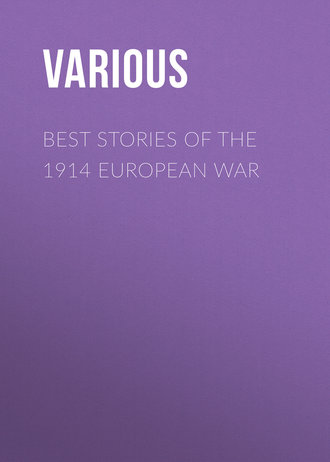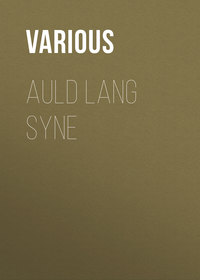
Best Stories of the 1914 European War
An eye witness of the loss of the German cruiser Ariadne and the German torpedo boat destroyer V-157 in the fighting between British and German warships off Heligoland, relates the following story of the fight:
“The destroyer was surprised in a fog by a large number of British destroyers and submarines. When the speed of the German destroyer became affected by the English shells, it turned and confronted the enemy with the intention of fighting to the end. Her engines, however, soon completely failed her, and she was blown up to prevent capture. Her crew continued firing until the boat disappeared beneath the waves.
“The Ariadne attacked gamely, but a shell plumped her boilers, putting half of them out of commission. Despite this the fight continued. The quarterdeck of the Ariadne took fire, but those of her guns that were still capable of being worked continued shooting.
“The forecastle of the Ariadne was soon ablaze. Her magazine was flooded, but the gallant vessel was doomed. Her crew was mustered and gave three cheers for the Emperor and sang the hymn, ‘The Flag and Germany Above All.’
“The sinking of the ship probably was due to the explosion of her magazine.”
SAVED; THEN THROWN INTO THE SEA
This little grim comedy is told by a correspondent of the London Evening News:
“I heard of an incident which is said to have occurred when the British boats were busy picking up German survivors of the fight in the Bight of Heligoland. A German officer was seen swimming, a line was thrown to him and he was helped on board, but his first action was to spit in the face of the British officer in charge.
“A British sailor immediately flung the German overboard and another drowning German among the many within the boat’s reach was helped into the vacant place.”
“FRENCH ARE VERY KIND”
The American Embassy in Paris is in daily receipt of letters written by dying German soldiers, forwarded to it by the French Government for transmission to Germany. One is from a German aviator who had fallen into the hands of the French. This man wrote:
“Good-by, dear father and mother; my leg has been crushed. The French officers are very kind.”
A postscript to this letter added by a French officer read:
“At this point the brave fellow died; please forward this to his parents.”
“I AM FIGHTING AGAINST MY SON!”
A story is told to-day of the bravery of French women and men which is vouched for as true. Gen. de Castelnau and his three sons went to the front at the outbreak of the war and Mme. de Castelnau retired to the south. One of the sons was killed in the early fighting.
When the news of his son’s death was conveyed to Gen. de Castelnau, he read the statement and then said quietly: “Gentlemen, let us continue.”
When the news reached the country house of the family in the south the parish priest undertook the delicate task of conveying the news of the death of her son to Mme. de Castelnau. The priest tried to break the news to her but was so overcome with emotion that she guessed something serious had happened. Mme. de Castelnau simply asked, “Which one?” meaning whether it was her husband or one of her three sons who had been killed.
When the 35th Regiment entered Muelhausen an aged Alsatian offered the soldiers everything he possessed, pressing them to accept wine and food. After they had finished their meal he bade them farewell, saying:
“I am now going to fight to kill my son, who is in the 40th Regiment of German infantry.”
WHO WAS THE WOMAN?
A correspondent tells of a strange little war picture. He got mixed with a French regiment on the right. In returning to his own regiment he says he crossed a field and passed up a big avenue of trees. Halfway up the avenue was a German officer of lancers lying dead at the side of the road.
“How he got there was a mystery,” the soldier said. “We had seen no cavalry, but there he lay. Some one had crossed his hands over his breast and had put a little celluloid crucifix in them. Over his face lay a beautiful little handkerchief – a lady’s handkerchief with lace edging. The handkerchief, too, was a bit of a mystery, for there wasn’t a woman within miles of the place.”
“WE DON’T WANT YOUR KAISER!”
“Go back to your Pomeranian grenadiers,” writes Henri Berenger, the Frenchman, to the German aviator who flew over Paris yesterday. “Mimi Pinson is not for you. We don’t want your Kaiser, nor your Kultur, nor your Kolossal, nor your capital. You are not even original. Wretched Prussian cuckoo, where did you get your wings? Who invented aviation, Germany or France? Who first crossed the Channel or the Alps, a German or a Frenchman? What did you bring under your wings that we should surrender to you intelligence, or liberty, or justice, or truth, or love? Nothing of the kind. You brought death – a bomb – that is all. That is why you will never have Paris. Paris is civilization in its beauty. You are barbarism in your ugliness. Possibly you may bombard us and burn our city, but we shall never surrender. Paris will be wherever the French flag floats, and in the end chantecler will crow over the bloody nests of your crushed tyrants.”
KING HONORS BOY SCOUT HERO
Georges Terpen, an 18-year-old Boy Scout of Liége, has just been decorated by the King of the Belgians and has received a commission in the army for the brilliant work which he has accomplished since the beginning of hostilities. Young Terpen captured eleven spies, all of whom have been shot. Near Malines he killed one Uhlan and captured another, although he was suffering from a broken arm.
Two fellow Boy Scouts, 16 and 17 years old, were executed by the Germans on the same day. Terpen declares that the only weapon he used against the German soldiers was a long knife.
THOUGHT FOES WERE FRIENDS
A corporal in a convoy of wounded at Champigny is quoted as saying that in the fighting at Guise a regiment firing on the line heard the signal to cease shooting. Immediately in front of them the men of the regiment saw soldiers wearing caps like the English.
They advanced, cheering the English, and were met by a deadly discharge of rifle fire. The Germans, he asserted, had used this subterfuge to draw the French on.
“COURAGE; DELIVERANCE SOON!”
The correspondent in Antwerp of an Amsterdam newspaper says that a French biplane appeared over Brussels Saturday and in a hail of German bullets twice circled the town, dropping hundreds of pamphlets containing the message:
“Take courage; deliverance soon.”
The aviator then made off, after giving the spectators a daring performance of loop the loop.
GERMANS TRICKED TO DEATH
Wounded men in the hospitals of Boulogne related to the London Express correspondent these incidents of the fighting between the British and Germans. One of the men, he says, told of a trick which the British learned in the Boer war which was carried out with deadly effect against the Germans. The story of the incident follows:
“The enemy before sending their infantry against our positions opened a hot artillery fire. Our artillery replied at first warmly, and then gun after gun of the British batteries went silent.
“What’s up now?” I asked a comrade. There were a few minutes more of artillery firing from the Germans, and then their infantry came on in solid formation. We received them with rifle fire. Still they came on and still we mowed them down. They were getting closer and we could plainly see the dense masses moving. Then suddenly the whole of our artillery opened fire.
“You see, the cannon had not been silenced at all, and it was a trick to draw the Germans on. They went down in whole fields, for our guns got them in open ground and, of course, they soon had enough. It was impossible for those behind to come on past the dead.”
SIGNAL DREW FATAL VOLLEY
The Hanover Courier prints this account by an eyewitness of the death of Prince Wilhelm of Lippe, who fell in the assault on Liége on Aug. 6:
“After fierce fighting at close quarters we proceeded successfully toward Liége. On the morning of the 6th we succeeded in getting on the northern walls of Liége, where, however, we were completely surrounded by Belgian troops, who drew ever closer around us and pressed us hard amid a hail of bullets. By order of his Highness our detachment formed a circle and we defended ourselves stoutly for some time, till at length we saw strong reinforcements coming to our aid.
“In order to enable them to locate the exact spot where we were the Prince rose to a kneeling position, pointed with his sword to the approaching column and gave me, who lay a hand’s breadth away from him, on top of our flag, the order to raise the flag so that we might be recognized.
“I raised the flag and waved it in a circle, which at once drew an extra hail of bullets from the enemy. The flag was shot out of my hands, while the same volley wounded the Prince fatally in the breast and throat. His last words were, ‘Remember me!’ ”
AMERICAN WOMEN’S ADVENTURE
Arriving home from France Mrs. Webster J. Scofield of Holmes told of riding 120 miles imprisoned in a freight car, from Chatillon to Paris, when the railroads suspended passenger service to move troops.
When she reached Chatillon, homeward bound, with two friends from Jacksonville, Fla., there were no trains to take civilians to Paris. They were told by a trainman that a freight car that stood on a side track filled with gun carriages was going to Paris, and that if they hid in it they could get through.
Mrs. Scofield, with three other women and two men, took the trainman’s advice. They had hidden five hours in the darkness when a brakeman locked the door and they were practically prisoners for six hours more, until a soldier heard their cries in the Paris freight yards and let them out.
BOMBARDMENT OF – KISSES!
When the British expeditionary army landed on French soil the natives went wild with joy and women overwhelmed “Tommy Atkins” with kisses. A letter received at London to-day by the wife of one of the soldiers at the front declares:
“You would have been jealous if you had seen the women, old and young, kiss us. I was kissed scores of times. The natives went frantic with joy when they saw us. The women screamed with joy as they hugged us. Many wept bitterly and then wiped away the tears and offered us small presents.”
GERMAN ARMY WONDERFUL
An eye witness to the entry of the victorious Germans into Brussels describes the advance as a wonderful sight. He writes as follows:
“The German entry into Brussels was a wonderful and impressive sight. I have seen many military parades in time of peace, but never a parade on so vast a scale, which went on without a hitch. It was impossible to imagine that these men had been fighting continuously for ten days, or that they had even been on active service. First of all came six cyclists, then a detachment of cavalry, then a great mass of infantry, then guns and field guns and more infantry, then huge howitzers, then a pontoon train and then more infantry from 1.30 o’clock Thursday until Sunday morning without a break.
“The pontoon trains were especially impressive. They were carried upside down on trolleys, drawn by six horses. All cavalry horses as well as the horses of the artillery and commissary were in wonderful condition. The men also were very fresh and keen. Each company had a stove, the fire of which was never out. There was always some hot drink ready for the troops and the German soldiers told me that it is only this hot coffee and soup which kept them going on long forward marches.
“The inhabitants of Brussels turned out by thousands to watch this endless procession of Germans as they marched by singing all sorts of songs and national airs. They sang in excellent tune, one company taking up the refrain as soon as another stopped. Like everything else their singing is perfectly organized.
“An aeroplane kept its station ahead of this advancing horde and it signalled both day and night by dropping various colored stars. What these signals meant I do not know, but all movements of the troops were regulated by them.
“I became overwhelmed after watching this immense mass of men marching by without a hitch for three days. I never believed such a perfect machine could exist.”
HE WASN’T HER HUSBAND
Mme. Gilbert, wife of the French aviator, was recently arrested near Clermont-Ferrand at the village of Paray-le-Monial, where she was informed her husband was being fêted on his return from a successful raid. On her arrival she found her alleged husband an impostor – a warrant has been issued for his arrest, since the real Gilbert is at Dole – and she was challenged by a gendarme when trying to return home. Finding her without papers and carrying German uniform buttons, which she bought from prisoners as souvenirs, he promptly arrested her. Release was obtained with difficulty on the arrival of her father-in-law with the necessary information.
COOL NERVE OF BELGIANS
Stories of the cool nerve of Belgian soldiers under fire are being told everywhere by refugees and correspondents arriving from the battlefield in lower Belgium. The story is told of one volunteer who returned after a skirmish with Uhlans and calmly announced: “Well, I killed two.” Then as he filled his pipe, he added:
“I hit one right there,” putting his finger to his forehead. “His helmet went spinning and I picked it up later and saw the hole my bullet made.”
Clerks, brokers, and business men have been turned into fighting devils. The Belgians were not out of their uniforms for days at a time. Sleeping and eating in the trenches when they could, they became veritable vagabonds. Even when catching a few winks of sleep the men lay with their rifles on their arms ready for action.
JOKE WHILE BULLETS FLY
The London Daily Chronicle’s correspondent telegraphs the following from Havre:
“ ‘I don’t know what has come over the German riflemen,’ an officer said to me to-day, ‘but our men have become almost totally indifferent to the German rifle fire. While it is going on they do their work singing, whistling and joking in the trenches.’
“An army doctor who heard this statement was able to confirm it in a remarkable way. Of 500 wounded who had come under his notice, or whom he had treated, only one was suffering from a rifle bullet wound. All the others had been hit by shrapnel bullets or bits of shells.
“I met to-day a gunner who is in charge of a Maxim gun, and who at one time found himself right in the center and facing an oncoming German frontal attack.
“ ‘But how we did mow them down,’ he said. ‘The section in front of me must have consisted of 800 men, and every one of them got something. We cleared the whole lot out, but from the flanks others closed up, and at last we had to run for it. We were forced to leave the gun behind, but, luckily, a well-planted German shell knocked it to bits before the Germans reached it.’ ”
“AIM AT BUTTON, HIT GERMAN”
Some striking stories told by wounded soldiers returning from France are given by the London Standard, among them the following:
“The blue-gray uniforms of the Germans are hard to see at a distance,” said a Yorkshire light infantryman, “and for concealing movements are more effective than our khaki, but it is surprising how quickly you learn to pick out such things as buttons, badges, armlets, and even peaks of caps or spikes of helmets in the sun and tell by them of the moving men you cannot see otherwise.
“Aim at a button a mile off and you hit a German in the stomach, is what we say, and it’s near enough to the truth. The Germans are such sticklers for rules that I have seen their artillery keep firing away at a position of ours after it had been occupied by their own men, and at the hospitals they find quite a number of Germans hit by their own rifle fire.”
WHAT HAPPENED? GOD KNOWS!
The London Daily News prints a despatch from a staff correspondent describing the recent fighting around St. Quentin. The despatch written at St. Quentin and forwarded to London via Boulogne, reads:
“A battle is raging, with heavy fighting. It began here Saturday, was continued yesterday, and was recommenced at dawn this morning. In a dense wood between St. Quentin and La Fere a number of people had taken refuge, peaceful peasantry for the most part. The wood was raided by a band of German cavalry and, although the white flag was hoisted on the outskirts, not the slightest notice was taken of it. The undergrowth was as dry as tinder. The way to clear the screen was obvious, and the order was given to fire it. This was done and in a few moments the wood was a huge, raging fury of flames, roaring madly.
“A priest engaged in Red Cross work who had struggled through from this desperate neighborhood told me this tale in the gray hours of this morning.
“ ‘What happened to the people there?’ I asked.
“ ‘What happened? The good God alone knows,’ he replied as tears rolled down his face.”
THOUGHT SCOTS AMAZONS
A never-ending source of wonder and delight to the French country folk are the kilted Highland regiments with the British expeditionary force. The Highlander in full gala rig, scarlet tunic, tartan phillibeg, with the gay “sporan” or pouch, white gaiters and big bearskin headdress, is a thing of beauty and joy forever at home, and even now when clad in khaki he is a remarkable sight for foreigners.
The French could hardly believe their eyes when they saw the husky regiments wearing what appeared to be short petticoats. True, the garment of khaki was like the jacket, but it was undoubtedly a petticoat. The inhabitants of the country through which they are passing generally put them down as some wild troop of Amazons which the English keep for serious fighting. When told that the kilted warriors are really men, and Scotchmen, they remember the famous Scotch guards of the old French kings and shout “Vivent les écossais!”
The bagpipes are another attraction and when the Gordons are stepping out to “The Cock of the North,” or the Argyle and Sutherlands are announcing their presence with “The Campbells Are Comin’,” whole villages follow them for miles. There are four Highland regiments with the British army, the two above mentioned, and the Black Watch and Camerons.
MOTHER’S TRIBUTE TO SON
When Lieut. St. Aubyn, killed in the Heligoland naval battle, was buried the other day in London, his mother sent a wreath bearing the inscription:
“To my darling boy. I thank my God upon every remembrance of you.”
The following authentic incident of the Heligoland fight is perhaps the most dramatic of the war. A British destroyer, having sunk an enemy, lowered a lifeboat to pick up German survivors. Before the lifeboat returned a German cruiser came out and attacked her, forcing her to abandon the lifeboat.
The British crew was left alone in an open boat without food twenty-five miles from the nearest land, and that land the enemy’s fortress, with nothing but fog and foes surrounding. Suddenly up popped a British submarine close by, opened the conning tower and took the British on board, leaving the German survivors alone in the lifeboat.
SAYS PRINCE TOOK HIS OWN LIFE
Prince Frederick William of Lippe took his own life following a mistake of his regiment, according to Lady Randolph Churchill, formerly Miss Jennie Jerome of New York, who has arrived in London from Germany by way of Holland.
“The true story of the death of Prince Frederick William of Lippe,” she said, “is that he committed suicide. He was commanding a German cavalry regiment before Liége on August 4 when his regiment, in the darkness of evening, nearly annihilated a German infantry regiment which it had mistaken for Belgians. The Prince shot himself, fearing to face the anger of Emperor William. His widow, with whom I am acquainted, was informed of his death on Aug. 14.”
“GET THE GUNS BACK!”
“A gallant deed was performed by Capt. F. O. Grenfell of the 9th Lancers,” cables a correspondent of the London Daily Mail. “He was hit in both legs and had two fingers shot off at the same time. Almost as he received these wounds a couple of guns posted near by were deprived of their servers, all of whom save one were struck by the bursting of shrapnel. The horses for the guns had been placed under cover.
“ ‘We’ll get the guns back!’ cried Grenfell, and at that, with several of his men, in spite of his wounds, he did manage to harness the guns up and get them away. He was then taken to a hospital.”
THE IRREPRESSIBLE CAMERA MAN
A correspondent sends the following by way of Antwerp:
“Yesterday morning a little man wearing an American army shirt, a pair of British officer’s breeches, French puttees and a Seaforth Highlander’s helmet, and carrying a camera the size of a parlor phonograph, blew into the American Consulate in Ostend while I was paying a flying visit there. He announced that his name was Donald C. Thompson, a photographer from Topeka, Kan. Thompson made nine attempts to get from Paris to the front. He was arrested nine times and spent nine nights in prison. Each time he was taken before a military tribunal. Utterly ignoring the subordinate officers, he would demand to see the commanding officer. He would grasp that astonished official by the hand and nearly wring it off, meanwhile inquiring solicitously after the General’s health and that of his family.
“ ‘How many languages do you speak?’ I asked.
“ ‘Three,’ said he – ‘English, American, and Yankee.’
“On one occasion he explained to the French officer who had arrested him that he was in search of his wife and daughter, who were dying somewhere on the Belgian frontier. The officer was so affected by the pathos of the story that he wept on Thompson’s neck and sent him forward in a Red Cross automobile.”
SAW FIFTY ZEPPELINS
William Parker of St. Louis, who arrived in London from Rumania last night, told of interesting things he had witnessed and passed through on his journey. He said:
“When we got to Breslau the mining of the town’s approaches was in operation and I had a good look at it. They were digging trenches about three miles outside of Breslau and burying horrible looking bombs eleven inches in diameter, row after row, as far as I could see. They seemed to fear a Russian attack.
“I was allowed the privilege of looking over their Zeppelins at Breslau, for use against the Russians.
“There seemed to be fifty of them, in tents with doors wide open. Operators, officers, men and equipment were all aboard, ready to start at a moment’s notice. They have sure got a system. I also saw some forty aeroplanes there.
“From Breslau we had a slow but not uncomfortable trip to Berlin. German officers who spoke enough ‘American’ to make themselves understood saw to it that we got coffee and food at stations along the way.
“You must know that ‘American’ is now officially recognized as a language. Signs up everywhere say ‘American spoken here.’ The bill of fare no longer reads ‘English roast beef,’ but ‘Amerikanischer roast beef.’ So all along the line. It’s all American now, not English.”
JEWS BRAVE FIGHTERS
A corporal and two privates of the Black Watch, all wounded, have just arrived in London from the front. They were surrounded by a crowd and cheered in the West End this morning. The corporal, telling how his regiment fought, said:
“In the thick of it we were singing Harry Lauder’s latest. Aye, ’twas grand. All around us were the dead and dying. Every now and then the German shells burst and as we peppered away at ’em we sang ‘Roamin’ in the Gloamin’’ and the ‘Lass o’ Killikrankie.’ ”
Somebody in the crowd asked: “What were the Jews doing?”
The Highlander replied:
“Their duty. We had three with us, and bonnier and braver lads I don’t wish to see. They fought just splendidly.”
A private in the Berkshire regiment added:









